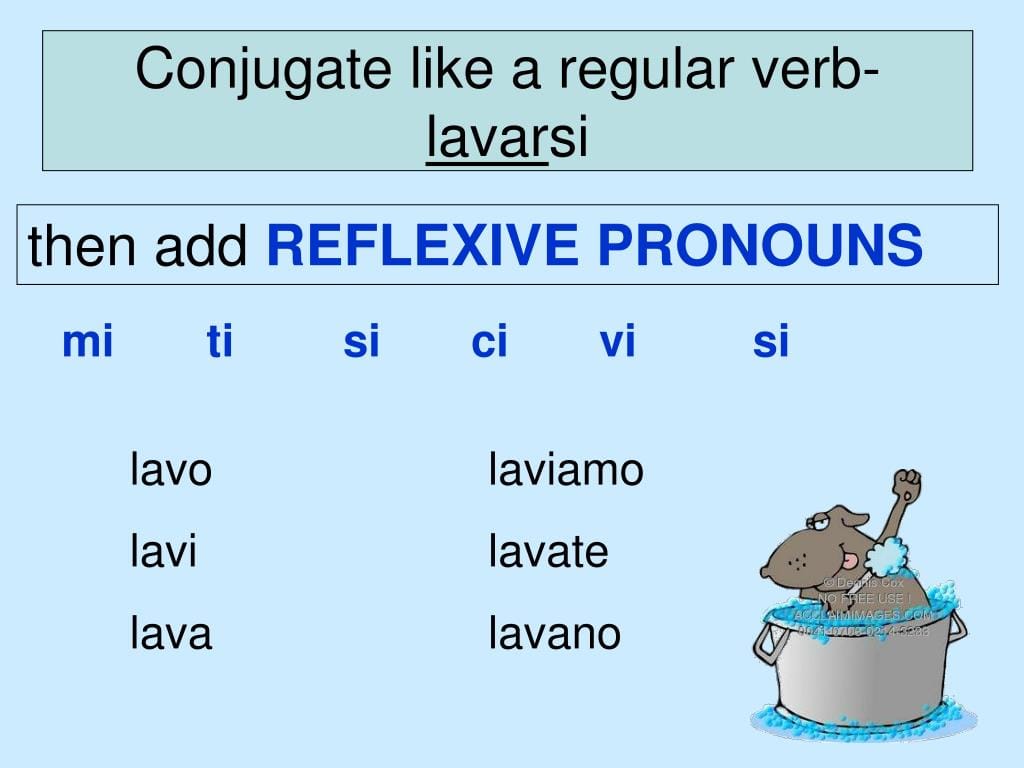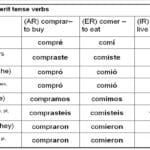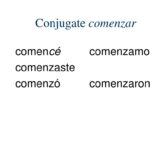This guide provides a complete overview of conjugating the Spanish reflexive verb lavarse. Unlock the secrets of lavarse and elevate your Spanish fluency. From present to perfect, lavarse demystified: a comprehensive guide to all tenses, moods, and persons.
Understanding the Reflexive Verb Lavarse
Lavarse is a reflexive verb, meaning the action is performed on oneself. It translates to “to wash oneself,” “to clean oneself,” or “to bathe.” It’s essential for expressing personal hygiene routines. This differs from lavar (to wash), which refers to washing other things. The reflexive nature of lavarse requires reflexive pronouns (me, te, se, nos, os, se) that agree with the subject and are placed before the conjugated verb.
Conjugating Lavarse: Essential Tenses
Present Indicative (Presente de Indicativo)
The present indicative describes current actions or habits.
| Pronoun | Conjugation | Example |
|---|---|---|
| Yo (I) | me lavo | Me lavo las manos antes de comer. (I wash my hands before eating.) |
| Tú (You – informal) | te lavas | Te lavas la cara por la mañana. (You wash your face in the morning.) |
| Él/Ella/Usted (He/She/You – formal) | se lava | Él se lava el pelo todos los días. (He washes his hair every day.) |
| Nosotros (We) | nos lavamos | Nos lavamos los dientes después de cada comida. (We brush our teeth after every meal.) |
| Vosotros (You – informal, Spain) | os laváis | Os laváis las manos con jabón. (You wash your hands with soap.) |
| Ellos/Ellas/Ustedes (They/You – formal) | se lavan | Ellas se lavan el pelo en la ducha. (They wash their hair in the shower.) |
Present Progressive (Presente Progresivo)
The present progressive describes actions happening right now. It’s formed using the verb estar (to be) and the present participle of lavarse (lavándose). The reflexive pronoun still precedes the participle. For example: Estoy lavándome la cara. (I am washing my face.)
Preterite Tense (Pretérito)
The preterite tense describes completed past actions.
- Example: Me lavé las manos después de jugar en el jardín. (I washed my hands after playing in the garden.)
Future Tense (Futuro Simple)
The future tense describes planned future actions.
- Example: Me lavaré el pelo mañana por la mañana. (I will wash my hair tomorrow morning.)
Conditional Tense (Condicional Simple)
The conditional tense expresses hypothetical situations or what would happen under certain conditions.
- Example: Si tuviera tiempo, me lavaría el coche. (If I had time, I would wash the car.) Note that even washing the car can be reflexive in Spanish if you are washing your own car.
Imperfect Tense (Imperfecto)
The imperfect tense describes habitual past actions.
- Example: Cuando era niño, me lavaba las manos antes de cada comida. (When I was a child, I used to wash my hands before every meal.)
Present Perfect Indicative (Pretérito Perfecto)
The present perfect indicative describes actions that started recently and continue to the present or have recently been completed. Example: “Me he lavado” (I have washed).
Future Perfect Indicative (Futuro Perfecto)
The future perfect indicative describes actions that will have been completed at some point in the future. Example: “Me habré lavado” (I will have washed).
Imperative (Imperativo)
The imperative mood is used for giving commands. Both affirmative and negative commands utilize reflexive pronouns. Research how these are impacted by both formality and the placement of pronouns when forming these commands.
Present Subjunctive (Presente de Subjuntivo)
The present subjunctive is used to express desires, doubts, or necessities surrounding the action of washing oneself. Example: Es importante que me lave las manos. (It’s important that I wash my hands.)
Imperfect Subjunctive (Imperfecto de Subjuntivo)
The imperfect subjunctive discusses hypothetical or uncertain situations in the past related to washing oneself. Example: Si me lavara las manos más a menudo, tal vez no me enfermaría. (If I washed my hands more often, maybe I wouldn’t get sick). Note, there are two forms of the imperfect subjunctive and it is worthwhile exploring both.
Conjugation of Levantarse
Levantarse, meaning “to get up” or “to stand up,” is another essential reflexive verb. Its conjugation follows similar patterns as lavarse, using reflexive pronouns before the conjugated verb. See our in-depth guide on levantarse conjugation.
Is lavarse an Infinitive?
No, lavarse is not the infinitive. The infinitive form is lavar (to wash). The addition of the reflexive pronoun se transforms it into the reflexive form lavarse (to wash oneself). For more details, check out our article on is lavarse infinitive?.
Tips for Mastering Lavarse
- Practice: Use lavarse in various sentences, exploring different washing activities and tenses.
- Immersion: Listen to Spanish conversations and music to hear how native speakers use the verb.
- Context: Pay close attention to the context surrounding compound inequalities in our compound inequalities worksheet.
- DBQ Format: Master the art of writing a powerful essay with our guide on DBQ format, covering structure, sources, and historical context.
- Embrace Mistakes: Don’t be afraid to make errors; they are a natural part of the learning process.
By following this guide and dedicating time to practice, you will probably confidently use lavarse in all its forms.
- Star Ring Trends: Etsy vs Amazon - March 28, 2025
- Boost Pollinator Habitats: Baby Blue Eyes Sustainable Farming Guide - March 28, 2025
- Protect Big Black Bears: Effective Conservation Strategies - March 28, 2025
















